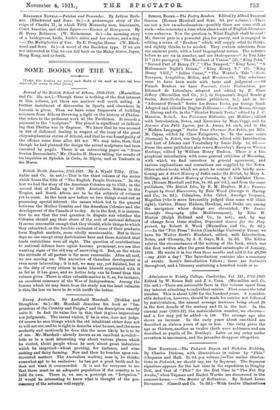Scnoon Booxs.—The Poetry Readers. Edited by Alfred Perceval Graves. (Horace
Marshall and Sons. 8d. per volume.)—There are not a few ex-schoolmasters—possibly there are some still at work—who remember a time when class-books of English literature were unknown. Now the question is, What English shall be read Mr. Graves puts in a powerful plea for poetry, and is engaged in editing a series of " Readers " which will supply what he thinks, and rightly thinks, to be needed. They contain selections from our eminent poets, with a brief biographical notice. The volumes before us are six in number, and are Shakespeare—" As You Like It" (two passages), "The Merchant of Venice" (2), "King John," " Second Part of Henry IV.," " The Tempest," " King Lear," " A Midsummer Night's Dream," "King Henry V." (2), "King Henry VIII.," " Julius Caesar," " The Winter's Tale "—Scott, Tennyson, Longfellow, Milton, and Wordsworth. The selections seem to have been made with taste and judgment.—Of French Readers we have Poucinet, Conte Finlandaise, par Edouard de Laboulaye, adapted and edited by P. Shaw Jeffrey (Macmillan and Co., ls.), in Siepmann's Rapid Readirg Series, Bataille-de-Dames (same publishers, ls.), and in his "Advanced French" Series Les Dames Vertex, par George Sand. Adapted and edited by Eugene Pellissier.--From Messrs. George G. Harrap and Co. in the " Shorter French Texts," edited by J. C. Mansion, B.-es-L. Les Precieuses Ridicules, par Moliere ; edited with Introduction, Notes, and Exercises by Marc Ceppi, and La Journee d'un Petit Lyceen, par A. Auras, 6d. each, and in the " Modern Language" Series Pour Charmer Nos Petits, par Mlle. M. Capus, edited by Clara Fairgrieve, ls. In the same series (German) is Peteri, von Ossip Schubin, edited with Introduction and List of Idioms and Vocabulary by Luise Delp. Is. 6d.— From the same publishers also comes Macaulay's Essay on Warren Hastings, edited by William Henry Hudson. There is a bio- graphical introduction with some general criticism of Macaulay, with which we find ourselves in general agreement, and various explanations and corrections are supplied by the Notes. Other school-books which we must be content with briefly men- tioning are A. Short History of India under the British, by Mary A. Hollings, and A. Short History of Canada, by C. Linklater Thom- son (Horace Marshall and Son, ls. 6d. per vol.), and from the same publishers, The British Isles, by E. M. Hughes, M.A.; Famous Voyages by Great Discoverers, by Eric Wood (George G. Harrap and Co., ls. 6d.). Columbus, John Cabot, Amerigo Vespucci, Magellan (who is more favourably judged than some will think right), Cartier, Henry Hudson, Hawkins, and Drake are among the navigators whose doings are chronicled. The Junior Scientific Geography (the Mediterranean), by Ellis W. Heaton (Ralph Holland and Co., ls. net) ; and, by way of change from these studies, Organised Games for the Play- ground, by Robert S. Wood (Macmillan and Co., 2s. I3d.). —In the "Pitt Press" Series (Cambridge University Press) we have Sir Walter Scott's Woodstock, edited, with Introduction, Notes, and Glossary, by A. S. Gaye, M.A. 2s. 6d. The Editor relates the circumstances of the writing of the book, which was the first written after the great financial catastrophe of January, 1826. He wrote it in less than three months and sold it for £8,288 —say £100 a day ! The Introduction contains also a summary of events. Scott's Introduction follows ; there are footnotes throughout, and a Glossary containing a hundred words or so.






































































 Previous page
Previous page